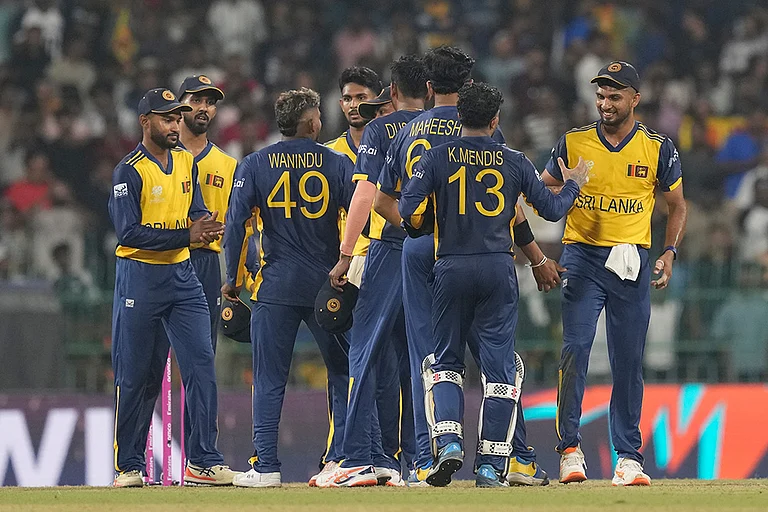As he took the floor to speak to some of India's top scientists in Bangalore last fortnight, Indian Space Research Organisation (ISRO) chairman K. Kasturirangan was oozing optimism. Indian space scientists will 'now' reach the moon, he proclaimed. A satellite would be designed to cruise around the moon and beam home data and images. And what will this mission achieve? It will launch an unmanned craft at a cost of Rs 400 crore and prove that India's space scientists have finally caught up with the US, almost 34 years after Neil Armstrong first stepped on the moon.
Sounds impressive on paper. But an influential section of the Indian scientific community is questioning the much-hyped plan—they are calling the "moon mission" as another case of skewed priorities. Interestingly, even within the ISRO, there are doubts about such a mission.
Here are some questions raised by the sceptics:
- Why launch a lunar mission more than three decades after Apollo 11? Reams of data on the experiments already conducted in lunar conditions are easily accessible. A few satellites are awaiting launch by the European Space Agency and Japan this year.
- The success of the mission would depend on perfecting the design and miniaturisation of a number of instruments and sensors to be carried on board. Can India produce such sophisticated equipment?
- The project involves risky launch manoeuvres—the satellite has to be nudged towards the moon over a five-day journey (about 4,00,000 km) in space.
- The data thrown up by this mission would benefit only a small section of the scientific community—astronomy and astrophysics projects are researched in only half-a-dozen institutes.
- ISRO could instead make a mark by working on low-cost access to space rather than such a glamorous project.
Says Prof U.R. Rao, former chairman, ISRO: "To make a mark, the objectives have to be focused and the instruments must be very good. The mission should work according to schedule and we should have groups who can use the data. Without this, it would be like any other mission." Adds Prof. R. Narasimha, a member of the Space Commission and director of the National Institute of Advanced Studies, Bangalore: "I think the objectives will have to be looked at very carefully. We don't see many researchers in astronomy who will benefit from the data."
Senior scientists point out that there has been a serious lack of prioritisation in the last decade vis-a-vis research. "We must have a group of people who decide the priorities in science, materials, engineering design and research or even physics. That will make way for a balanced growth of science in India," says Prof C.N.R. Rao, former director of the Jawaharlal Nehru Centre for Advanced Scientific Research, Bangalore.
Prof V. Rajamani of the School of Environmental Sciences, jnu, New Delhi, who was invited by the ISRO for a presentation on the lunar mission, feels that the funds ought to be spent in the social sector. "We must have a water mission first so that all of us have sufficient drinking water. We'll have a problem on hand if we do not have the manpower to interpret data sent by this satellite. What is the use of cooking a fantastic meal when you don't have anyone to relish it?" he asks.
Prof Govind Swarup, who set up the Giant Metre-wave Radio Telescope (gmrt) at the National Centre for Radio Astronomy, Pune, suggests that the ISRO must take a "harder look" at the mission after a formal approval by the Centre. "Since this is a science mission, it'll be of great value if ISRO takes this opportunity to foster closer relationship with university and iit students and their faculty, besides popularising science among the youth.
However, others are confident that ISRO (one of the 'holy cows' of Indian science—the Defence and Research Development Organisation and the Department of Atomic Energy being the other two) will get a go-ahead from New Delhi. They point out that the Rs 400-crore budget, to be spent over a five-year period, would work out to a fraction of ISRO's annual budget (for 2002-03, the estimate was about Rs 2,200 crore). "Besides, it might boost India's self-esteem because China is also doing a lot of work on similar projects and has announced a manned mission to the moon," says one scientist.
ISRO's scientists also say the project would help rejuvenate Indian science from the limbo it has slipped into lately. They quote Kasturirangan as saying that the mission will "electrify" and draw youngsters to work in space research.
But not everyone is electrified. At the Indian Institute of Science, Bangalore, aerospace experts who often team up with ISRO were doubtful of the mission's success. "We don't dispute the fact that they have a rocket to launch the satellite and have done well with remote sensing satellites. But one ought to have expertise in miniaturisation of some of these instruments. The project could be delayed if any country denies us the sensors we want. At the end of it all, how much of value addition will be possible? Will it help us win a Nobel prize?" they ask.
However, P.V. Indiresan, former director, iit-Chennai, supports the moon mission. "For years, we have been thinking that we will be forever poor. It's time we maximise the expertise and go ahead with such exciting and unusual missions. You never know what the results could be till the satellite is in place."
At ISRO, scientists are hoping that other countries will join the lunar project with their research and technological inputs. The Canadian Space Agency has shown interest. With a little help from others, ISRO may be in a position to go for a moon walk, the tricolour in hand. - The success of the mission would depend on perfecting the design and miniaturisation of a number of instruments and sensors to be carried on board. Can India produce such sophisticated equipment?






















